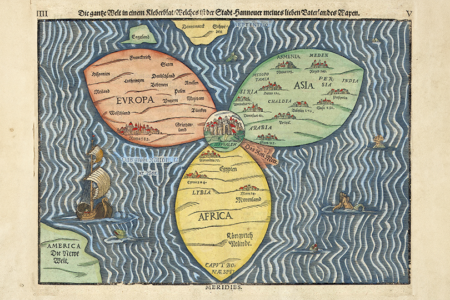The Purpose of Jesus’ Miracles
An Important Question and Answer
Why did Jesus of Nazareth perform miracles? Was it simply because He was a compassionate Person and wanted to help people? According to the Scriptures, this was not the major reason. The primary purpose of Jesus’ miracles was to demonstrate the fact that He was the Messiah promised by God to Israel through the prophets.
The Basis for the Answer
This conclusion concerning the purpose of Jesus’ miracles is based upon three lines of testimony found in the Scriptures.
The first line of testimony comes from Jesus Himself. On one occasion, after a group of Jewish leaders had asked Him to tell them plainly if He were the Messiah, Jesus answered, “I did tell you, but you do not believe. The miracles I do in my Father’s name speak for me” (John 10:24-25, NIV). On another occasion Jesus indicated that those who saw His miracles had a solemn responsibility to believe His claims (John 15:24).
The second line of testimony consists of some written statements by the Apostle John. John declared that he recorded some of Jesus’ miracles in his gospel account in order that his readers “may believe that Jesus is the Christ, the Son of God” (John 20:30-31, NIV). Inasmuch as John earlier had declared that the word “Christ” is simply a translation of the word “Messiah” (John 1:41), this was his way of saying that Jesus’ miracles should convince his readers that Jesus is the Messiah.
On another occasion John stated that, even though Jesus had performed so many “miraculous signs in their presence,” the Jews of His day “still would not believe in him” (John 12:37, NIV). This statement indicates that Jesus’ miracles were performed for the purpose of pointing out the fact that He was the promised Messiah.
The third line of testimony is found in Jesus’ response to John the Baptist’s question. John prepared the way for Jesus’ ministry by testifying to Israel concerning Jesus’ person and work. John himself believed that Jesus was the Messiah (John 3:25-30). However, after John was imprisoned by Herod, he began to have some doubts. If Jesus were truly the Messiah, the King of Israel, then why was His servant languishing in prison? Because of these doubts John sent a question to Jesus, asking Him if He were the Messiah who was to come (Luke 7:18-20).
In response to this question, Jesus performed numerous miracles before John’s messengers. Then He said to them, “Go back and report to John what you have seen and heard: The blind receive sight, the lame walk, those who have leprosy are cured, the deaf hear, the dead are raised, and the good news is preached to the poor” (Luke 7:21-22, NIV). Jesus performed these miracles to reassure John that He was indeed the Messiah.
The Evidence for the Answer
What is the evidence for believing that the primary purpose of Jesus’ miracles was to demonstrate the fact that He was the Messiah promised by God to Israel through the prophets? The evidence consists of a comparison of Jesus’ miracles with Old Testament prophecies concerning the future Messianic Kingdom.
The Old Testament prophets foretold the miraculous changes that would come to the world when Messiah would establish and rule over the future Messianic Kingdom. A comparison of Jesus’ miracles with these prophecies indicates that every time Jesus performed a miracle He thereby demonstrated to the people of Israel that He was the Messiah, the One who had the powers necessary to produce the miraculous changes of the Messianic Kingdom. Different aspects of that comparison will be examined now.
First, the prophets foretold beneficial changes in the earth’s climate and natural elements for the Messianic Kingdom (Isa. 30:23-26; Ezek. 47:1-12; Joel 2:21-26; Zech. 14:8). The effectiveness of the sun would be increased, and abundant rains would fall when needed. Special streams of water would flow out from Jerusalem to cleanse polluted bodies of water and to cause waste places to become very fruitful. Jesus demonstrated His power to control the earth’s climate and natural elements by walking on the water of the Sea of Galilee and by stilling two storms (Matt. 14:24-33; Mark 4:35-41).
Secondly, according to the prophets the Messianic Kingdom would be characterized by unprecedented growth and fruitage of trees (Isa. 41:19-20; Ezek. 36:8-11, 29-30; 47:6-7, 12; Joel 2:21-26). Jesus evidenced His power to control the growth and fruitage of trees by cursing a fig tree and causing it to wither immediately (Matt. 21:18-20).
Thirdly, the prophets declared that there would be great productivity of animals, including a huge multitude of fish, during the Messianic Kingdom (Jer. 31:10-12; Ezek. 36:11; 47:8-10). Twice Jesus miraculously produced a huge draught of fish for His disciples after they had fished all night without catching any (Luke 5:1-11; John 21:1-12). Here was evidence that He could produce the great productivity of animals, including the huge multitude of fish of the Messianic Kingdom.
Fourthly, the prophets proclaimed that the Messianic Kingdom would be blessed with a superabundant supply of food (Ps. 72:16; Isa. 30:23-24; Jer.31:10-14; Ezek. 34:25-30; 36:29-30; Joel 2:21-26; Zech. 8:11-12). Famine would be abolished. Jesus exhibited His power to produce this superabundant supply of food by expanding five loaves of bread and two fish into more than enough food to feed five thousand men (John 6:5-14) and on another occasion seven loaves and several small fish into more than was needed to feed four thousand men (Mark 8:1-9).
Fifthly, according to the prophets, wine would be abundant in the Messianic Kingdom (Jer. 31:10-12; Joel 2:21-26; Amos 9:13; Zech. 8:11-12). Jesus displayed His ability to produce the wine of the Messianic Kingdom when He turned water into wine (John 2:1-11).
Sixthly, the prophets predicted great changes in the animal world for the Messianic Kingdom (Isa. 11:6-9; 65:25). The ferocity of wild animals would be taken away. Wild animals would live peacefully with gentle animals. Flesh-eating animals would eat vegetable life. Small children would play with these animals without receiving harm. Twice Jesus performed the miracle of the draught of fishes (Luke 5:1-11; John 21:1-12); He cast demons into swine (Mark 5:1-20), and He caused a fish with a coin in its mouth to come to Peter at the right time to be caught (Matt 17:24-27). Here was evidence that Jesus had control over animals and could, therefore, produce the animal changes of the Messianic Kingdom.
Seventhly, the prophets asserted that the Messianic Kingdom would be free from ordinary hazards (Isa. 11:8-9; 65:23-25; Ezek. 34:25-29). No longer would people be susceptible to attack by wild animals. No longer would they be threatened by famine. Jesus manifested His power to accomplish this freedom from hazards by stilling two storms, thereby saving His disciples (Matt. 14:24-33; Mark 4:35-41).
Eighthly, it was announced by the prophets that the Messianic Kingdom would be characterized by the healing of physical diseases and deformities (Isa. 29:18; 33:24; 35:5-6). The lame would be made to walk, the blind made to see, the deaf made to hear, and the dumb made to speak. No longer would anyone say, “I am sick.” Three times Jesus healed lame people (Matt. 8:5-13; Mark 2:1-12; John 5:1-9). He caused seven blind men to see (Matt. 9:27-31; 12:22; 20:29-34; Mark 8:22-26; John 9:1-41). He cured two deaf people (Mark 7:31-37; 9:14-29) and four dumb people (Matt. 9:32-34; 12:22; Mark 7:31-37; 9:14-29). He also healed those at the point of death (John 4:46-54), those possessed by demons (Matt. 9:32-34; 15:21-28; Mark 1:21-28; 5:1-20; 9:14-29), those with fever (Mark 1:29-34), lepers (Mark 1:40-45; Luke 17:11-19), those with withered hands (Mark 3:1-6), those with issues of blood (Matt. 9:20-22), those with infirmity (Luke 13:10-13) and those with dropsy (Luke 14:1-24). He replaced a severed ear (Luke 22:50-51). In addition He performed many other miracles of healing which are not specifically recorded (Matt. 4:23-25; 8:14-17; 9:35; 15:29-38; Mark 1:29-34; 6:56; Luke 4:38-41; 5:15; 6:17-19; 7:21). Through all of these, Jesus showed that He had the power to perform the healing of the Messianic Kingdom.
Ninthly, the prophets foretold that the Messianic Kingdom would be marked by great longevity of life (Isa. 65:20-22). The one hundred year old person would be classified as a child; infancy would be measured by years, not days; old men would live a full life, and the days of God’s people would be as the days of a tree. Jesus raised Lazarus, Jairus’ daughter and the widow’s son from the dead, thereby lengthening their lives beyond their normal span (Matt. 9:18-26; Luke 7:11-17; John 11:1-44). Here was evidence that He possessed the power to produce the longevity of life of the Messianic Kingdom.
A Past Response to the Miracles
It is evident that Jesus performed His miracles for the purpose of demonstrating to the Jews of His day that He was the Messiah. But “even after Jesus had done all these miraculous signs in their presence, they still would not believe in him” (John 12:37, NIV).
This disbelief had been foretold over 700 years earlier when the Prophet Isaiah declared, “Lord, who has believed our message, and to whom has the arm of the Lord been revealed?” (Isaiah 53:1; cf. John 12:38). The message to which Isaiah referred was the report that Jesus was the Messiah, the One who could establish the Messianic Kingdom. The revelation of the powerful arm of God came through the miracles of Jesus.
Isaiah continued by foretelling that, instead of being desired by the Jews, Messiah would be despised and rejected (Isaiah 53:2-3). Isaiah also declared that, as a result of Israel’s rejection of her Messiah, He would suffer and die as an offering for sin (Isaiah 53:4-12). In other words, God would use the rejection of Jesus by the Jews as His means of providing “the Lamb of God, who takes away the sin of the world” (John 1:29, NIV).
Israel’s past negative response to Jesus’ miracles brought tragedy to the nation as a whole and to individuals within the nation. Those individuals who rejected the witness of the miracles died in their sins. The nation as a whole was devastated a few years later by the Romans and has continued to be abused by the Gentiles ever since. Jesus foretold this tragedy when He said:
O Jerusalem, Jerusalem, you who kill the prophets and stone those sent to you, how often I have longed to gather you children together, as a hen gathers her chicks under her wings, but you were not willing! Look, your house is left to you desolate. I tell you, you will not see me again until you say, “Blessed is he who comes in the name of the Lord” (Luke 13:34-35).
Again, when He wept over Jerusalem, He declared to her:
If you, even you, had only known on this day what would bring you peace – but now it is hidden from your eyes. The days will come upon you when your enemies will build an embankment against you and encircle you and hem you in on every side. They will dash you to the ground, you and the children within your walls. They will not leave one stone on another, because you did not recognize the time of God’s coming to you (Luke 19:41-44, NIV).
A Present Opportunity to Respond
Jesus’ miracles were performed to demonstrate His messiahship, not only to the Jews of His day, but also to you who live today. The Apostle John stated that he recorded Jesus’ miracles in order that “You may believe that Jesus is the Messiah, the Son of God” (John 20:30-31). The Jews of Jesus’ day suffered tragedy as a result of disbelieving the witness of His miracles. By contrast you will receive eternal life if you believe the witness of His miracles, for John says that by “believing you may have life in His name” (John 20:31).
* In addition to being a regular contributor to ISRAEL MY GLORY, Dr. Showers has written the book, WHAT ON EARTH IS GOD DOING?, published by Loizeaux Brothers. For an outstanding and comprehensive overview of biblical history, this book is strongly recommended.







